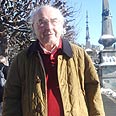
Switzerland plays neutrality card
Former ambassador to Geneva chides Swiss president for meeting with Iranian president, says country cannot remain neutral in the face of Holocaust denial. Historian Arieh Kochavi explains why Switzerland's neutrality serves its long-term interests
Swiss President Hans-Rudolf Merz justified his meeting with Iranian President Mahmoud Ahmadinejad on Monday, asserting to his critics that Switzerland is maintaining its neutrality.
The neutrality card failed, however, to win over at least one skeptic, Israel's former ambassador to Geneva, Yitzhak Meir.
"It was impossible to remain neutral in the face of the evil of World War II, and it is impossible to remain neutral in the face of Ahmadinejad," Meir told Ynet.
"As a friend of Switzerland, I believe that the president was mistaken in his understanding of the average citizen's stance in Switzerland today," said Meir, who dispatched a letter to Merz's office in Berne.
"I wrote to him that what he did wasn't just wrong, it was a gross error. I regret this, and it pains me as a man who has seen the other sides of Switzerland."
"
The former ambassador believes that Switzerland has yet to understand that the neutrality it aspires to is not feasible.
"The committee that Switzerland formed after WWII acknowledged the fact that the country carried out a role that the Swiss couldn't forgive themselves for. They couldn't come to terms with what occurred in their country in the name of 'neutrality' – their policies regarding Jewish refugees. And here, once more the issue of neutrality is on the table."
Meir emphasized that Switzerland does not deny the Holocaust like Ahmadinejad and his ilk, but added that this is what makes the meeting so problematic.
"Holocaust deniers will be able to use the meeting despite Switzerland's stance. This meeting is grave because it creates a sort of banality and laicization of the Swiss attempt not to forget the Holocaust. I see President Merz's choice as an anti-Swiss act."
Legitimizing the denial
Professor Arieh Kochavi, head of the University of Haifa's School of History and director of the Strochlitz Institute of Holocaust Studies, also sees Switzerland's use of the noninvolvement card as crossing a red line.
"It's hard for me to accept the claim that Switzerland welcomed Iran because it is neutral," said Professor Kochavi.
"Ahmadinejad is the leading political figure to overtly deny the Holocaust. Meeting with him legitimizes that position. Speaking as a historian, and as a human being – it cannot be accepted and should have been rejected."
According to Kochavi the theoretically neutral role Switzerland played during the war was extremely problematic. "It allowed German ground troops to pass through its territory and upheld economic and business ties with Germany. In essentially cooperation with the Germans and actively aided the German war effort," he said.
"You could say that up until 1944 Switzerland was 'German-leaning neutral.' In 1938 it was the first country to demand Germany imprint the letter 'J' onto the passports of its Jewish citizens, to prevent their immigration to Switzerland. After that there was the issue of Swiss banks keeping money that belonged to Jews who perished.
"Switzerland changed its sympathetic leaning towards Germany only when its leaders realized that the Allies had the upper hand. They forced it to change its position through economic sanctions.
"However it is still surprising, disappointing and frustrating that a country that behaved a certain way during that certain period would continue to behave this way. I would expect the Swiss president not to welcome the Iranian president," Kochavi said.
"I don't think that their neutrality today is intended to serve any immediate agenda but rather accumulated gain, Just as the Swiss did not take part in the war between the Communist bloc and the West, today's move also serves its economic and political interests. You must remember that most UN organizations operate in Switzerland, and they make the most of all worlds."










